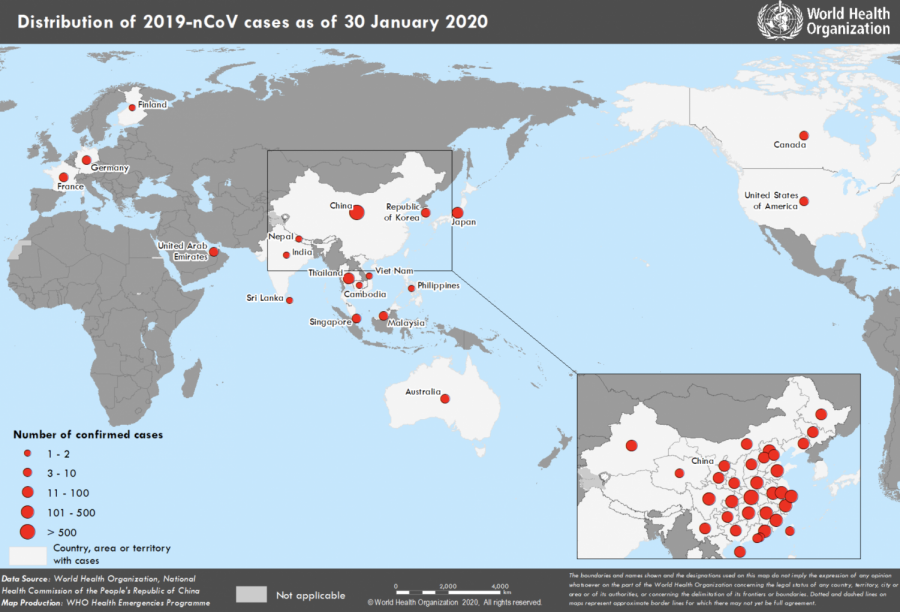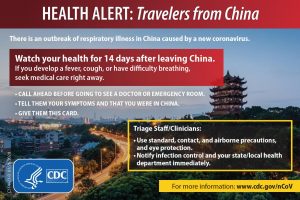Novel coronavirus continues to spread, nations escalate safety measures to combat outbreak
The Centers for Disease Control and Prevention (CDC) confirmed the first person-to-person transmission of the novel 2019 coronavirus, 2019-nCoV, in the U.S., according to a press release yesterday.
This case involved the husband of a patient who had recently returned to Illinois from Wuhan, China, the center of the outbreak, and was diagnosed with 2019-nCoV on Jan. 2, CDC officials reported at a telebriefing yesterday.
According to the CDC’s situation summary, the general American public is currently unlikely to be exposed to the virus, and the risk of infection is low. Individuals who are exposed to the virus, such as medical workers and close contacts, may experience a higher risk of infection.
The International Health Regulations (IHR 2005) Emergency Committee of the World Health Organization (WHO) convened yesterday and declared the 2019-nCoV outbreak a Public Health Emergency of International Concern (PHEIC), reversing its previous resolution that the outbreak did not constitute a PHEIC. The WHO’s risk assessment categorizes China as “very high,” with the regional and global levels at “high” risk.
The U.S. Department of State has issued its highest level travel advisory, warning against all travel to China due to the rapid spread of the 2019-nCoV. The CDC has also issued a Level 3 travel warning to avoid all nonessential travel to China.
So far, the CDC has confirmed six cases of the 2019-nCoV across four U.S. states, which are Washington, Illinois, California and Arizona. The CDC reported yesterday that more cases, as well as the potential for more person-to-person spread, are expected.

A map of the 2019 novel coronavirus outbreak, released by the World Health Organization yesterday.
According to yesterday’s telebriefing, CDC officials do not currently recommend the use of face masks for the general public, as “the virus is not spreading in the general community.”
While the virus currently poses low risk to residents in Santa Clara County, pharmacies throughout the county are experiencing a shortage of face masks.
According to the nearest CVS to the upper school campus, all CVS stores in the Bay Area are temporarily out of face masks. The branch received a new shipment this morning and ran out within the day.
For the next shipment, the branch ordered 500 boxes, but will only be receiving five due to the general shortage of masks. The next shipment will arrive to the store Wednesday and be on the shelves Thursday morning.
CVS customers are limited to buying one box of face masks at a time. The number of masks per box varies by brand but ranges between 10 and 20.
According to a situation report published by the WHO yesterday, the novel 2019 coronavirus, identified by WHO as 2019-nCoV acute respiratory disease, has 7818 confirmed cases worldwide, with 170 deaths. Of the confirmed cases, 82 are outside China, where the virus originated, spread out across 18 total countries.
The CDC currently conducts ill traveler response across 20 quarantine stations in the U.S., with five active screening points for travelers from Wuhan, China, at the airports in San Francisco, Los Angeles, New York City, Chicago and Atlanta.

An information card provided by the CDC and given to all travelers returning from China.
Additionally, all travelers from China will receive an information card about the coronavirus, providing instructions on how to detect symptoms and how to respond should symptoms develop.
On Jan. 28, the U.S. Embassy in China evacuated U.S. government personnel as well as some private U.S. citizens from Wuhan, China. These travelers were transported to Ontario, C.A., where they are currently undergoing medical evaluation and risk assessments.
The passengers will undergo a voluntary isolation period of at least 72 hours.
The IHR 2005 Emergency Committee recommended a WHO mission to China to investigate the source of the virus, which is believed to have originated in an animal; the biological mechanism of the virus itself, including its clinical severity and ability to spread from person-to-person and possible means of containing the virus’s spread.
As the virus’s spread accelerates across the world, residents living in affected areas are monitoring the situation with increasing anxiety. At midnight on Jan. 28, the University of Southern California (USC) notified students of a false report of 2019-nCoV in one of its main off-campus residencies after the report, widely disseminated via social media, raised alarms across the student community.
The alert, which was sent via email to USC students, stated that “no one affiliated with USC has developed the illness.”
At 10:39 p.m. on Jan. 28, USC student residents at the apartment complex The Lorenzo received an email from manager Chance Kidd about a newly confirmed case of 2019-nCoV within the apartment complex.
The Lorenzo, located about half a mile, or a ten-minute walk, northeast of the USC campus, is a popular off-campus housing option for upperclassmen students.
USC students disseminated screenshots of Kidd’s email on group chats and social media platforms, expressing concern at the spread of the virus.
Shania Wang (‘19), a freshman at USC on the pre-medical track, heard of this false report from Instagram and other social media channels, where her peers have been sharing the email.
While she said that she was “not particularly” concerned about the coronavirus at 8:06 p.m. last night, she expressed heightened worries after she heard rumors of the Lorenzo case and decided on a number of preemptive measures that she plans to take, such as wearing her mask, ceasing to share food and drink and sanitizing more.
“I think now I am a lot more concerned because it feels very close now,” she said. “I do think that based on the previous cases, we are not necessarily the most at-risk population because CDC reports that it does primarily target people above the age of sixty and of poor health, but I also know that I need to take more precautionary measures and just be aware, because I can’t just take my health for granted.”
USC officials responded to this report a few hours later, updating the community that the report was “incorrect.” USC administrators and health officials have since posted regular updates to their website about the 2019-nCoV. No cases have directly impacted the university.
Additional reporting by Eric Fang.
This is a developing story. Check Harker Aquila for future updates.

Kathy Fang (12) is the editor-in-chief of Harker Aquila. This is her fourth year on staff. From covering local marches and protests to initiating Harker...


















![“[Building nerf blasters] became this outlet of creativity for me that hasn't been matched by anything else. The process [of] making a build complete to your desire is such a painstakingly difficult process, but I've had to learn from [the skills needed from] soldering to proper painting. There's so many different options for everything, if you think about it, it exists. The best part is [that] if it doesn't exist, you can build it yourself," Ishaan Parate said.](https://harkeraquila.com/wp-content/uploads/2022/08/DSC_8149-900x604.jpg)




![“When I came into high school, I was ready to be a follower. But DECA was a game changer for me. It helped me overcome my fear of public speaking, and it's played such a major role in who I've become today. To be able to successfully lead a chapter of 150 students, an officer team and be one of the upperclassmen I once really admired is something I'm [really] proud of,” Anvitha Tummala ('21) said.](https://harkeraquila.com/wp-content/uploads/2021/07/Screen-Shot-2021-07-25-at-9.50.05-AM-900x594.png)







![“I think getting up in the morning and having a sense of purpose [is exciting]. I think without a certain amount of drive, life is kind of obsolete and mundane, and I think having that every single day is what makes each day unique and kind of makes life exciting,” Neymika Jain (12) said.](https://harkeraquila.com/wp-content/uploads/2017/06/Screen-Shot-2017-06-03-at-4.54.16-PM.png)








![“My slogan is ‘slow feet, don’t eat, and I’m hungry.’ You need to run fast to get where you are–you aren't going to get those championships if you aren't fast,” Angel Cervantes (12) said. “I want to do well in school on my tests and in track and win championships for my team. I live by that, [and] I can do that anywhere: in the classroom or on the field.”](https://harkeraquila.com/wp-content/uploads/2018/06/DSC5146-900x601.jpg)
![“[Volleyball has] taught me how to fall correctly, and another thing it taught is that you don’t have to be the best at something to be good at it. If you just hit the ball in a smart way, then it still scores points and you’re good at it. You could be a background player and still make a much bigger impact on the team than you would think,” Anya Gert (’20) said.](https://harkeraquila.com/wp-content/uploads/2020/06/AnnaGert_JinTuan_HoHPhotoEdited-600x900.jpeg)

![“I'm not nearly there yet, but [my confidence has] definitely been getting better since I was pretty shy and timid coming into Harker my freshman year. I know that there's a lot of people that are really confident in what they do, and I really admire them. Everyone's so driven and that has really pushed me to kind of try to find my own place in high school and be more confident,” Alyssa Huang (’20) said.](https://harkeraquila.com/wp-content/uploads/2020/06/AlyssaHuang_EmilyChen_HoHPhoto-900x749.jpeg)


